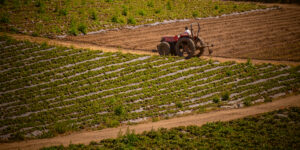Philanthropy can seed agroecology

If you’ve ever flown over California’s Central Valley or the Midwest, you might have noticed expansive quilt-like patches of agricultural landscape. Indeed, over the past century, we’ve come to expect that farmland is organized into tidy, uniform squares.
In fact, those squares represent a dramatic loss to the planet. Today, on International Biodiversity Day, it’s crucial to consider how global industrial food systems hurt our world. Philanthropists can help change those systems for the better by supporting farmers pursuing agroecology, which draws from Indigenous knowledge to create resilient food systems that preserve biodiversity and feed communities.
Around the world, farmland now growing single crops was once a thriving habitat for a variety of species — animal and plant. Biodiversity isn’t only about polar bears and pollinators. More than 200,000 edible plant species have nourished humans throughout our time on Earth, including during the thousands of years we have practiced agriculture.
But over the past century, with the rise of industrial agriculture, at times heavily funded by philanthropic dollars, we’ve abandoned 75% of all crops we once farmed in favor of singular species that, to grow, require harsh chemicals, immense irrigation systems and polluting machinery.
We once believed these methods were essential to feed the world — we’ve added 7 billion people to the planet in less than 100 years. But in fact, we have built a food system that is at once enormous and extremely fragile. The global food system is the single largest cause of biodiversity loss worldwide and accounts for one-fourth of humanity’s greenhouse gas emissions. It has degraded not just our soil but also our ocean, which is deeply affected by all we do on land.
Industrial-scale farming has also stripped many farmers of their land and livelihoods and left one billion people chronically underfed — despite producing more than enough for everyone to eat. The ongoing pandemic has made the vulnerability of food supply chains dangerously clear, and everything from war in Ukraine to heatwaves in Canada mean volatile commodity prices that can impoverish farmers in a day.
There is a better way for philanthropists to support locally led efforts across the planet to feed people and protect biodiversity, a path that’s being led by African farmers. Through the Schmidt Family Foundation’s grantmaking program, 11th Hour Project, we’ve spent years learning from and supporting farmers who are stewarding land sustainably and feeding their communities across Africa. We’ve watched as farmers worldwide have come together to demand that agroecology replace large-scale industrial agriculture — including by organizing against what is misleadingly labeled the “green revolution.”
Ahead of last fall’s U.N. Food Systems Summit, the farmer movement known as the Alliance for Food Sovereignty in Africa called on donors to stop supporting the harmful green revolution in favor of a new transformation, one that protects the environment, produces healthy, accessible food, fosters vibrant local food economies, celebrates cultural traditions and diversity, and protects the land rights of farmers and rural communities.
Many of the organizations we support are already hard at work on that transition. In Ghana, the Centre for Indigenous Knowledge and Organizational Development is working with farmers to sustainably grow diverse and locally relevant food and to create access to markets. In Mali, L’Institut de Recherche et de Promotion des Alternatives en Développement, or IRPAD, built a regional seed bank for farmers to store up to 84 tons of quality native seeds. Across southern Africa, the Rural Women’s Assembly is making visible the role that women farmers play as guardians of seed and biodiversity. And across West Africa, the We Are the Solution network brings rural women together to share agroecological practices, helping them produce healthy food for their communities.
Over the past several decades, philanthropy has frequently sought silver-bullet solutions for strong food systems — the perfectly engineered seed, the newest harvesting and growing technologies — but has overlooked agroecology and locally led solutions as a promising path forward. More and more evidence — including troves of local knowledge and hundreds of studies analyzed in peer-reviewed papers — is proving that approach wrong. Science, in other words, is confirming the Indigenous knowledge and practice that sustained human life around the globe for many thousands of years.
Transitioning to sustainable practices is not without challenges. The decks — and dollars — have been stacked in favor of industrial agriculture for decades. But philanthropy can help mitigate this by supporting farmers as they experiment and innovate, work with researchers who focus on local knowledge, share experience and test new, helpful technologies. Philanthropists can also give more grants, particularly multi-year funding for the long run, to the scientists drawing from local and laboratory knowledge.
Many funders, including those we partner with to support organizations like the Agroecology Fund, are already on board. Support for mitigating climate change via transforming the food and agriculture sectors has tripled since 2015. The number of philanthropists participating in Funders of Regenerative Agriculture has quadrupled in only two years. Even so, it’s not enough to make a dent in agriculture, literally one of the world’s largest industries, employing more than 1 billion people and producing more than $1 trillion worth of food annually. We need more philanthropists to step up and listen to farmers around the world who are loudly calling for agroecological practices to sustain humanity and the planet.
In other words, farmers have already sown the seeds that have grown the plants, the farms, the food systems and the worldwide movement for agroecology and food sovereignty. Now, they just need what you might call seed funding — and a lot of it.
Wendy Schmidt is co-founder and president of the Schmidt Family Foundation. She and her husband Eric also founded Schmidt Ocean Institute and Schmidt Futures.